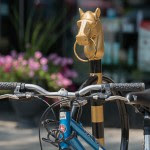Here in the US, one normally expects to see a bicycle-mounted police officer in a park, on a college campus or in some other place where there are narrow alleys or paths, like large housing complexes.
It seems, however, that cities and towns are figuring out that such patrols can be very useful in downtown areas. If you have cycled in such places, as I so often have, you know that you can often reach a given destination before a car or bus, especially when traffic is heavy.
That is basically the reason why there are still bike messengers, even when offices have scanners and e-mail systems. Some things require that actual people physically sign for them, or have to be delivered by hand for other reasons. When I was a messenger, I routinely made trips from Midtown to the Wall Street area in five to ten minutes that would have taken twenty minutes to half an hour in a motorized vehicle.
But I digress. Now ever-smaller cities and towns are seeing the usefulness of bicycle patrols.
One such municipality is Wimberley, in the south-central part of Texas, between Austin and San Antonio. With less than 3000 residents, it doesn't have its own police station, so it depends mainly on deputies from the Hays County Constable and the county sheriff's department to respond to emergencies.
As often as not, those emergencies are the cause of traffic congestion in the downtown area. Emergency trucks have an especially difficult time getting to the scene of an accident, explosion or some other emergency quickly. In situations like those, saving seconds can mean saving a life. And, as Constable Ray Helm explains, "those guys on their bikes can get there within 20 seconds" when it might take minutes for a first responders' vehicle. Also, "they can access different parts of the city trucks can't," he notes.
Also, those quick arrivals make it more likely for officers to de-escalate tense situations, like the ones that unfolded this weekend when gas stations ran out of fuel. Tempers flared, and the officers on bicycles avoided traffic tie-ups and were thus might have arrived just in time to prevent a fracas.
In sending constable's deputies on bicycles, the department was also able to use less of its own gasoline--which, of course saves money. I am sure that would sway a few folks who might not be moved by the other benefits--such as improved community relations (Officers and the public deal with each other face-to-face rather than through a metal encasement.) that accrue from getting officers out of their cars and onto bikes.
It seems, however, that cities and towns are figuring out that such patrols can be very useful in downtown areas. If you have cycled in such places, as I so often have, you know that you can often reach a given destination before a car or bus, especially when traffic is heavy.
That is basically the reason why there are still bike messengers, even when offices have scanners and e-mail systems. Some things require that actual people physically sign for them, or have to be delivered by hand for other reasons. When I was a messenger, I routinely made trips from Midtown to the Wall Street area in five to ten minutes that would have taken twenty minutes to half an hour in a motorized vehicle.
But I digress. Now ever-smaller cities and towns are seeing the usefulness of bicycle patrols.
One such municipality is Wimberley, in the south-central part of Texas, between Austin and San Antonio. With less than 3000 residents, it doesn't have its own police station, so it depends mainly on deputies from the Hays County Constable and the county sheriff's department to respond to emergencies.
As often as not, those emergencies are the cause of traffic congestion in the downtown area. Emergency trucks have an especially difficult time getting to the scene of an accident, explosion or some other emergency quickly. In situations like those, saving seconds can mean saving a life. And, as Constable Ray Helm explains, "those guys on their bikes can get there within 20 seconds" when it might take minutes for a first responders' vehicle. Also, "they can access different parts of the city trucks can't," he notes.
Also, those quick arrivals make it more likely for officers to de-escalate tense situations, like the ones that unfolded this weekend when gas stations ran out of fuel. Tempers flared, and the officers on bicycles avoided traffic tie-ups and were thus might have arrived just in time to prevent a fracas.
In sending constable's deputies on bicycles, the department was also able to use less of its own gasoline--which, of course saves money. I am sure that would sway a few folks who might not be moved by the other benefits--such as improved community relations (Officers and the public deal with each other face-to-face rather than through a metal encasement.) that accrue from getting officers out of their cars and onto bikes.

![Larry Batten, Chain Reaction Ministries coordinator, refurbishes bicycles at First Christian Church of Oklahoma City to give away to those who need them. [Photo by Jim Beckel, The Oklahoman]](https://cdn2.newsok.biz/cache/w640-1fe82ca5d5855fe575898c063dbaa974.jpg)


